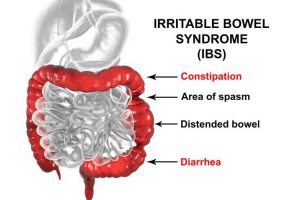CAUSES OF IRRITABLE BOWEL SYNDROME

Irritable bowel syndrome (IBS) is a chronic digestive disorder that affects a large number of people. It affects slightly more women than males and usually begins in early adulthood, but many gastroenterologists believe it can strike at any age.
Irritable bowel syndrome is a condition that affects the gut, specifically the large intestine or colon. To comprehend how it functions, you must first comprehend how the digestive system functions.
Food goes through your digestive tract, including your stomach and small intestine, before reaching your big intestine. Food is broken down and absorbed into the body throughout this voyage. The intestinal wall squeezes in on itself in a regular manner to keep the food moving through the system, slowly pushing the contents through. The gut wall becomes more sensitive and excitable as a result of IBS. The contractions might be too fast, resulting in diarrhoea, or too slow, resulting in constipation.
Irritable bowel syndrome can be quite uncomfortable, yet it does not harm the intestines. The function of the gut is disrupted in irritable bowel syndrome, although all components of the gut appear normal under a microscope.
CAUSES
We don’t know exactly what causes irritable bowel syndrome, however, there are a few probable factors, including:
- Emotion and stress
- Gastroenteritis and other infections
- a number of drugs
These are hypothesised to have an impact on how the neurological system interacts with the gastrointestinal tract.
SYMPTOMS
- Headache
- Poor appetite
- Backache
- Nausea
- Muscle pain
- Tiredness
- Heartburn
Treatment and Diagnose
Irritable bowel syndrome can’t be detected with a test. Your gastroenterologist, on the other hand, can look for a pattern in your symptoms. Your gastroenterologist can also request testing to rule out any other issues. A blood test, a stool test, a colonoscopy, or X-rays of your lower GI tract are all possible tests.
- IBS does not need surgery and it is not different for everyone to shorten your life and treatment. You may have to try various options to find the option that works for you. In certain cases, many people with mild symptoms need no therapy and some steps often alleviate the symptoms and improve the quality of their lives. Take the following:
- Identification of relaxation techniques and relieve stress
- Exercise regularly
- Diabetes change can dramatically improve your symptoms. You can help the disease with your way of eating. Some common food factors are:
- Other gas-producing foods kale, legumes, and other
- Alcohol
- Caffeine
- Dairy products
- Raw fruits
Consult a specialist gastroenterologist to check if you have any symptoms associated with irritable bowel syndrome. Rifagaut (Rifaximin) treats conditions like irritable bowel syndrome and more. Consult your doctor before taking the medicine.
